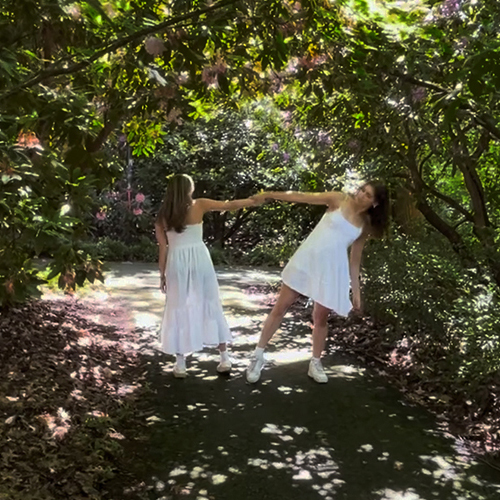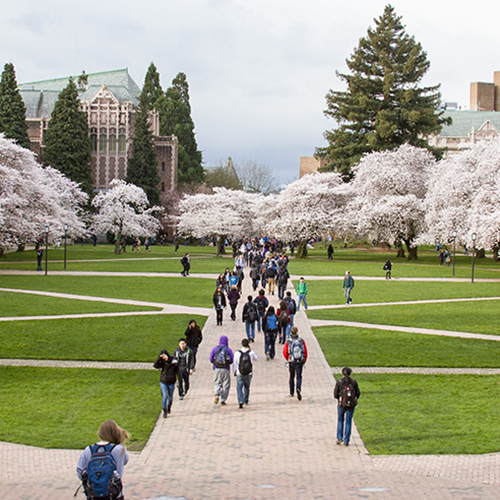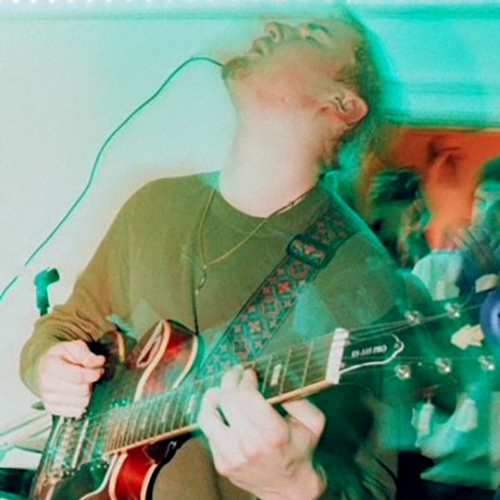When nearly 5,000 freshmen arrived on campus in late September, they had a lot to learn—fast. The shortest route to class. Library protocol. Faculty expectations. But 360 classmates were already up to speed, thanks to Discovery Seminars.
Introduced this year, Discovery Seminars are intensive month-long classes designed to meet the needs of incoming freshmen. They are taught just prior to autumn quarter by experienced faculty, with no more than 25 students in each class. The 24 seminars offered this year covered everything from the Puget Sound ecosystem to Aristotle’s Poetics.
“We call them Discovery Seminars because their basic feature is to help students understand the process of discovery—formulating questions, deciding how to go about answering those questions—which is a basic characteristic of an education at a research university,” says Susan Jeffords, A&S divisional dean for the social sciences, who spearheaded the effort. “Hopefully by having that framework, the students will be able to optimize their UW education.”

And understand what it means to be in college. The sad truth is that many students arrive thinking it will be like high school, only bigger.
“I remember a new assistant professor once asking me, ‘When do we tell them they’re not in high school anymore?’” says Jeffords. “I didn’t have an answer. It sometimes takes students a while to realize that expectations of a college education are different. It’s not just a bigger, better high school. It’s a different level of learning. With the Discovery Seminars, they understand that right away.”
An Opportunity for Depth
For many students, the Discovery Seminar’s main appeal is the opportunity to settle into campus life at a leisurely pace. “I wanted to familiarize myself with my surroundings before the big rush of people came in,” explains one freshman, speaking for many of her peers.
But what motivates faculty, who spend many hours designing new courses for the program?
For astronomy lecturer Toby Smith, who mostly teaches large survey classes, it was the opportunity to teach a small class. He designed his seminar around a topic of personal interest: the Apollo missions. “The format of the seminar allowed me to go into the subject in greater detail than I can in other classes,” he says.
Communication Professor Valerie Manusov also chose a topic—the symbolic potential for nonverbal cues—that she covers only briefly in other classes. “It was a topic I wanted to explore further,” she says, “and I also liked the idea of teaching a real specialty class to undergraduates, since many of the classes I teach are survey classes.”

That is an important aspect of the seminars, explains Paul LePore, director of undergraduate program development for the College of Arts and Sciences and affiliate assistant professor of sociology. “These courses are not looking to cover broad sweeps,” says LePore, who coordinated the program and taught a seminar himself. “The real strength of this university is that in every corner, there are faculty and students asking the greatest questions of the day. We wanted that to come across.”
David Allen, professor of psychosocial and community health, had an additional motivation. He wanted more contact with freshmen, since most of his courses are at the graduate level. His goal for his seminar, “Race and Identity at the UW,” was to have students view the diversity on campus as a resource. “I teach this content to sophisticated doctoral students,” he says, “and this group of freshmen approached the material with an openness that was breath-taking. It was a spectacular experience.”
Setting High Standards
Before teaching his seminar, Allen wasn’t sure what to expect of entering freshmen. “I was worried that I wouldn’t pitch the course right, finding that balance between challenging and overwhelming,” he says. Fortunately, he was able to discuss his concerns with other Discovery Seminar faculty in a one-day workshop, led by Valerie Manusov and History Professor Robert Stacey, prior to teaching the seminar.
“The faculty talked a lot about expectations,” says Jeffords. “We decided to set standards high, to show students how exciting and challenging it can be to be at a research university. We also agreed to have a writing experience in all classes, with Norman Wacker, lecturer in the Interdisciplinary Writing Program, advising faculty on how to structure writing assignments and provide effective feedback on writing.”
Allen assigned a five-page paper plus three shorter papers in his seminar each week. “For two-thirds of the students, a five-page paper was the longest paper they’d ever written,” he says. “I thought they’d complain about the writing. None of them did. And with this small class size, I was able to give them individual feedback on every paper.”
Stacey took that a step further. In his seminar, “Medieval People,” he required students to take notes during one lecture, type them up, and hand them in. “I wanted to see how they were taking notes,” he said. “When you take notes, it changes the way you listen. You have to think in an active way about where the speaker is in the lecture, whether the point being made is part of the current argument or the beginning of a new argument.” Stacey wrote comments on the students’ notes but did not grade them. “It was a way of saying, ‘This is a skill you need,’” he says.
Stacey also planned his seminar to include three types of history reading—textbooks, scholarly articles, and primary source materials. “We read each of these differently,” he explains. “I felt they were all important, so I found a way to include all three types of reading.”
In Manusov’s seminar, reading assignments were often related to the following day’s activities. The message was clear: skip the reading and you’ll miss out. “If they didn’t do the reading, they could see that they were at a distinct disadvantage,” she says. “I hope they continue to appreciate how much more they learn when they’ve done the reading ahead of time.”
An Experience Worth Repeating
The long-term impact of this guidance in reading, writing, and note-taking remains to be seen. But some benefits of the seminars are evident immediately.
“Making the big step from high school to college has been easier by starting without the chaos of thousands of upper classmen surrounding me,” says Glorya Cho, a freshman whose seminar was team-taught by two faculty. “My professors usually teach graduate-level courses. I found it both exciting and generous that they were willing to share their guidance and expertise with freshmen.”
“The environment was nonthreatening and not overwhelming, something I think is of infinite value to a freshman,” adds Sarah Warburg.
Michael Spector describes his professor as “great and enthusiastic” and his class as “small and personal.” He says, “If I had to do everything over, I would definitely sign up for the program again.”
He won’t have the opportunity, since the program is for entering freshmen. But faculty may repeat the experience.
“I’d do it again in a heartbeat,” says Toby Smith. “It’s a lot of work in a frantic month, but it’s worth it.”
Adds Manusov, “The biggest thing was that it was really fun. There’s something about teaching students who haven’t done this before. It’s a different experience. You can’t take anything for granted. It increased my enthusiasm for teaching generally.”
More Stories

Dancing Across Campus
For the dance course "Activating Space," students danced in public spaces across the University of Washington's Seattle campus this spring.

Four Students Shine as 2024 Dean's Medalists
Meet the four new graduates honored as College of Arts & Sciences Dean's Medalists for 2024.

Celebrating Contemporary Indigenous Music
Markus Teuton, a musician and citizen of Cherokee Nation, explores contemporary Indigenous music through his academic work and as host of “Indigenous Jazz,” a radio show.